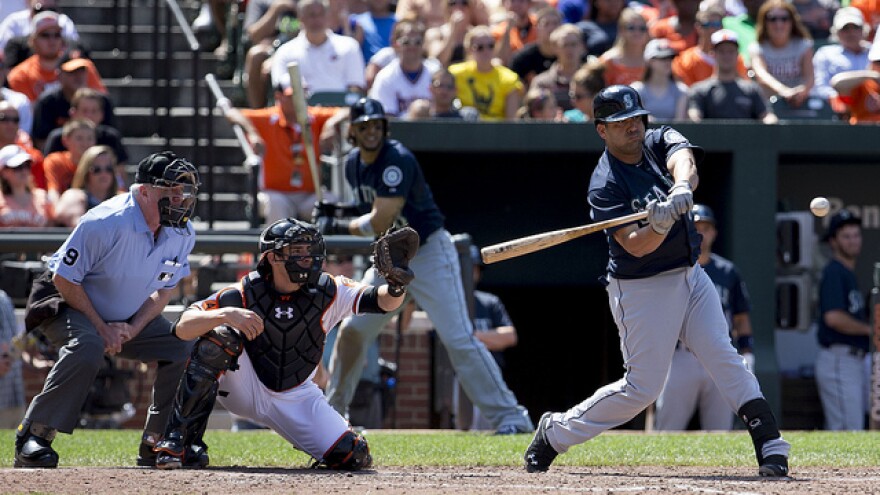After five decades of hostility, President Obama is moving to normalize diplomatic relations with Cuba. There’s a place in Kansas City, though, where the two countries already seem very close: Kauffman Stadium.
Kendrys Morales, the Royals’ new hitting star is from Cuba, and across Major League Baseball the number of Cuban players is on the rise. But those players reached the U.S. as refugees, and some worry that warming relations with Cuba may actually crimp the supply of baseball talent from Cuba.
Morales signed with the Kansas City Royals last winter as a replacement for the popular Billy Butler who departed for Oakland. Morales, who turns 32 in June, defected from Cuba for good on a raft 11 years ago, his eighth attempt to get away. He’s an established major leaguer now, but knows the wealth of baseball talent still in Cuba.
“There’s a lot of talent and diamonds in the rough,” said Morales through translator Royals coach Pedro Grifol. “He’s hoping that those guys get a chance to show their abilities here because it’s not only guys that have been around for awhile, but young kids coming up now that he’s heard about and extremely talented.”
This year, 18 players who were born or raised in Cuba, suited up for Major League teams on Opening Day. Yasmany Tomas, whom Royals general manager Dayton Moore tried to sign, plays for the Arizona Diamondbacks.
“You can’t make excuses for not being able to sign a player. It’s just the way it is,” said Moore.
Tomas instead signed with Arizona for a six-year deal worth more than $68 million. That’s the second most lucrative deal given to a Cuban defector. The Tomas deal is topped only by Rusney Castillo, who signed with Boston for seven years and $72 million.
These are the best of times for Cuban defectors to make money.
“Right now, MLB has had it real good in one sense,” said Peter Bjarkman, a baseball historian on Cuba. “They can simply wait for these guys to leave and they’re leaving in increasing numbers because of the attraction of the big dollars in the United States and poor economy in Cuba.”
Bjarkman believes the movement of baseball players from Cuba to the U.S. will be more restricted if relations between the U.S. and Cuba move closer to being normalized.
“Cuba is not going to abandon their domestic baseball league and their powerful national team. It’s too important an institution in Cuba,” said Bjarkman.
They have seen what happened with baseball in the Dominican Republic, baseball in Venezuela and in Puerto Rico where Major League Baseball essentially simply went in there and harvested all of the talent out of those countries.”
The Royals are a prime example. Since Dayton Moore became general manager, the Royals increased their presence in Latin America. Royals catcher Salvador Perez of Venezuela and starting pitcher Yordano Ventura, a Dominican, signed as teenagers and developed in the U.S.
Bjarkman figures that major league teams won’t be able to sign Cuban teens. Instead, he said that teams will bid for players already under contract in Cuba. Like they do with Japanese players.
“A major league team could bid to negotiate with that player by paying a certain fee,” he said. “I think now, with some of the Japanese players, the Japanese ball clubs have been paid something like $10, $12 or $15 million that they have to pay to the Japanese league just to negotiate a contract with the player.”
If diplomatic relations between the U.S. and Cuba are normalized, Dayton Moore isn’t sure what Major League Baseball will do to tap Cuba for Players.
“It’s obviously an area with a lot of great talent, and I think Major League Baseball will do an excellent job in the long run for making sure that every team, every organization has an opportunity to compete for that talent,” said Moore.
In the meantime, the Royals are getting their money’s worth on Kendrys Morales. His RBI double put the Royals in the lead for good in the series — clinching victory against Oakland on Sunday, then he came through again with another tie-breaking hit the next day against the Minnesota Twins. Again, it resulted in a Royals victory.
The Royals are paying Morales more than $6 million this year. Had they picked up their option on Butler, the Royals would have paid Butler more than $12 million this year.
Though future restrictions may make it more difficult to sign players from Cuba, for now the Royals are content with the Cuban player they have.




